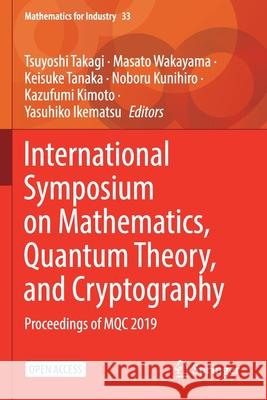International Symposium on Mathematics, Quantum Theory, and Cryptography: Proceedings of Mqc 2019 » książka
topmenu
International Symposium on Mathematics, Quantum Theory, and Cryptography: Proceedings of Mqc 2019
ISBN-13: 9789811551932 / Angielski / Miękka / 2021 / 290 str.
International Symposium on Mathematics, Quantum Theory, and Cryptography: Proceedings of Mqc 2019
ISBN-13: 9789811551932 / Angielski / Miękka / 2021 / 290 str.
cena 160,99
(netto: 153,32 VAT: 5%)
Najniższa cena z 30 dni: 154,18
(netto: 153,32 VAT: 5%)
Najniższa cena z 30 dni: 154,18
Termin realizacji zamówienia:
ok. 16-18 dni roboczych.
ok. 16-18 dni roboczych.
Darmowa dostawa!
This open access book presents selected papers from International Symposium on Mathematics, Quantum Theory, and Cryptography (MQC), which was held on September 25-27, 2019 in Fukuoka, Japan. The international symposium MQC addresses the mathematics and quantum theory underlying secure modeling of the post quantum cryptography including e.g. mathematical study of the light-matter interaction models as well as quantum computing.
The security of the most widely used RSA cryptosystem is based on the difficulty of factoring large integers. However, in 1994 Shor proposed a quantum polynomial time algorithm for factoring integers, and the RSA cryptosystem is no longer secure in the quantum computing model. This vulnerability has prompted research into post-quantum cryptography using alternative mathematical problems that are secure in the era of quantum computers. In this regard, the National Institute of Standards and Technology (NIST) began to standardize post-quantum cryptography in 2016.
This book is suitable for postgraduate students in mathematics and computer science, as well as for experts in industry working on post-quantum cryptography.











